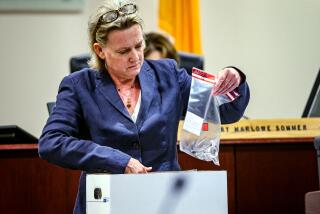High Court Is Asked to Kill Hedgecock Hearing
- Share via
Charging that a “fatally flawed” appellate ruling could put “jurors . . . on trial,” the California attorney general’s office Wednesday asked the state Supreme Court to overturn a decision ordering a lower-court hearing on jury-tampering allegations in the case of former San Diego Mayor Roger Hedgecock.
In a 30-page brief asking the Supreme Court to review the case, prosecutors argued that the 4th District Court of Appeal’s April ruling contradicts other court decisions, violates a California law designed to protect jurors’ rights, and “threatens the very fabric of the criminal justice jury system in this state.”
The appellate court’s ruling also raised several other significant legal questions that should be resolved by the Supreme Court, said Robert Foster, the supervising deputy attorney general who is handling the appeal in the celebrated case.
3 Months to Decide
The Supreme Court has three months to decide whether to review the case, Foster said. If the justices decide to consider the 2 1/2-year-old appeal and schedule oral arguments, a final ruling may not come until next year.
Wednesday’s brief is the latest round in a flurry of legal maneuvering touched off by the appellate court’s April 25 ruling that ordered a Superior Court judge to hold a full evidentiary hearing on the jury-tampering allegations--charges that Hedgecock’s attorneys argue should result in a reversal of his 13-count felony conspiracy and perjury conviction.
However, the appellate justices added that if the judge denies Hedgecock’s request for a new trial his conviction and one-year jail sentence should stand.
At the same time, the three-justice panel rejected a wide array of legal arguments--ranging from insufficient evidence to claims of legal errors by a judge and prosecutors--offered by Hedgecock’s attorneys as reasons why he deserves a new trial.
The decision thus displeased both sides, with defense attorney Charles Sevilla unhappy to see most of his arguments dismissed and prosecutors concerned about the prospects of the hearing on the tampering allegations.
As a result, both attorneys asked the 4th District justices to reconsider their ruling, a legal long shot considering that granting a rehearing would have been tantamount to an admission by the justices that they erred in their decision. Not surprisingly, the justices last week issued another order reaffirming their original ruling.
Deterrent to Jurors
Foster, however, argued in Wednesday’s brief that the appellate justices did err by ordering the hearing on the tampering charges.
“The decision of the Court of Appeal . . . creates a system in which virtually no citizen would be willing to be on a criminal jury,” Foster wrote. “What citizen would agree to be on a criminal jury knowing that, following a conviction, he or she might be forced to testify concerning the events during the deliberation? What citizen would be willing to become involved in a situation where the jurors are, in effect, put on trial?”
The tampering charges stem from sworn allegations from two jurors--contradicted by statements from the 10 other jurors--that a court bailiff improperly discussed the case and their progress in moving toward a verdict during their deliberations.
In denying Hedgecock a new trial in December, 1985, then-Superior Court Judge William L. Todd Jr. rejected the defense’s contentions that the bailiff’s actions, which also included providing alcoholic beverages to the jurors for consumption after their daily deliberations, tainted the jury’s verdict.
The appellate court, however, faulted Todd for the process by which he arrived at that decision. Todd had refused to permit testimony by the jurors or the bailiffs, deciding the issue solely on the basis of sworn affidavits filed by all parties.
By not ordering a fully evidentiary hearing, the appellate court ruled, Todd “denied Hedgecock a fair and complete opportunity to have his serious allegations of misconduct properly considered.”
Foster, however, said in Wednesday’s brief that the appellate ruling is diametrically opposed to California law and other court rulings, and violates jurors’ “right to be left alone, a right not to be bothered (by) the losing side.”
“With the constant possibility of making public what was intended to be the private deliberations of the jury, there is a real rise of the destruction of all frankness, freedom of discussion and debate within the jury itself,” Foster wrote.
Other important legal questions posed by the 4th District’s ruling, he said, concern the methods by which Hedgecock’s attorneys sought unsuccessfully to disqualify Todd from the case and the legal weight that should be attached to the affidavits filed in connection with the tampering charges.
Defense attorney Sevilla also plans to formally ask the state Supreme Court to review the case, though for markedly different reasons than those cited by Foster Wednesday.
In his brief to the Supreme Court, Sevilla will renew his bid for a new trial, arguing that the evidence supporting the jury-tampering allegations is sufficient to merit an outright reversal of Hedgecock’s conviction, not merely another hearing on their import.
More to Read
Sign up for Essential California
The most important California stories and recommendations in your inbox every morning.
You may occasionally receive promotional content from the Los Angeles Times.













